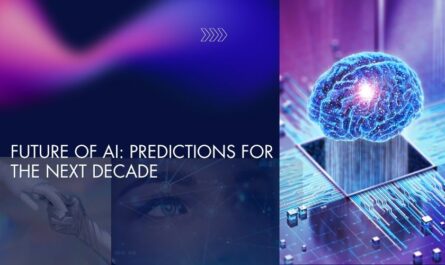In today’s fast-paced market, making smart, data-driven decisions can mean the difference between success and failure. The rise of AI business decisions has transformed how companies operate — from predicting market trends to automating customer insights. Artificial Intelligence (AI) is no longer just a tech buzzword; it’s a powerful tool that helps entrepreneurs and organizations make informed choices faster and with greater accuracy.
Whether you’re a small business owner, marketer, or executive, understanding how to leverage AI for business decision-making can help you reduce risk, save costs, and identify new opportunities before your competitors do. Let’s explore how AI can revolutionize your business decisions and the best ways to implement it.
What Are AI Business Decisions?
AI business decisions refer to using artificial intelligence systems to analyze data, predict outcomes, and support strategic choices. Instead of relying solely on human intuition, AI tools process massive amounts of structured and unstructured data to find patterns, correlations, and insights that humans might miss.
These insights can guide everything — from setting prices and managing inventory to improving customer service and forecasting revenue. With AI, businesses no longer have to guess; they can make decisions based on real-time, actionable data.
Why AI Is Essential for Modern Business Strategy
AI has become essential because it helps businesses handle the complexity of data in the digital age. Every day, companies generate thousands of data points through sales, customer interactions, and marketing campaigns. AI tools process this data automatically, giving leaders a clear picture of what’s working and what’s not.
According to a McKinsey report on AI and business transformation, companies using AI for decision-making see improved productivity, better customer retention, and higher profitability. These insights help decision-makers act quickly and confidently, even in uncertain conditions.
Key Ways AI Helps You Make Better Business Decisions
1. Data-Driven Decision-Making
AI can analyze large datasets far faster than any human team. It can detect hidden patterns, forecast demand, and recommend the best course of action based on accurate data. For example, a retail company can use AI analytics to determine which products are most profitable and which need promotional discounts.
You can also read this Link: AI data analytics tools (example.com)
2. Predictive Analytics for Smarter Forecasting
Predictive analytics powered by AI allows businesses to anticipate trends, customer behaviors, and potential risks. By evaluating past data and current trends, AI can help managers make future-proof decisions. This capability is particularly useful in finance, logistics, and marketing — industries where timing is everything.
To check out this Link: Predictive Analytics Explained
3. Automation of Routine Decisions
AI automates repetitive decision-making processes such as approving transactions, monitoring compliance, or responding to common customer queries. This frees up human managers to focus on strategic goals rather than operational details. It’s a critical part of AI workflow automation that increases productivity while reducing human error.
4. Enhanced Customer Insights
AI can analyze customer data across channels — from emails to social media — to provide deeper insights into customer preferences. This allows businesses to personalize their marketing campaigns and product recommendations. For example, e-commerce platforms use AI algorithms to suggest products based on previous purchases and browsing history.
You can also read this Link: AI marketing tools (example.com)
5. Risk Management and Fraud Detection
AI tools like machine learning models can detect irregular patterns that may signal fraud, cyberattacks, or financial risks. In banking and insurance, AI is already being used to identify unusual activities and reduce losses. These predictive models can also help businesses prepare for potential crises before they happen.
6. Improved Hiring and HR Decisions
AI-driven platforms are transforming recruitment by scanning resumes, analyzing skills, and predicting employee performance. By using AI for HR decisions, companies can identify top candidates faster and reduce bias in the hiring process.
7. Smarter Financial Decisions
AI algorithms are used in accounting and finance to forecast revenue, optimize investments, and manage budgets. They can quickly identify inefficiencies and recommend cost-saving measures. Businesses that integrate AI business decisions into their financial systems often see better returns and improved accuracy in financial reporting.
Top AI Tools That Support Business Decision-Making
1. Tableau + Einstein AI
Tableau’s integration with Einstein AI (by Salesforce) allows businesses to visualize data and uncover insights through predictive analytics. It’s one of the most powerful tools for turning complex data into easy-to-understand dashboards.
Best for: Executives and analysts who want visual data insights.
2. Microsoft Power BI with Copilot
Power BI combines with Copilot AI to help users explore trends, forecast outcomes, and generate visual reports. It simplifies data interpretation for non-technical users.
Best for: Small businesses and enterprise teams needing fast insights.
3. Google Cloud AI
Google Cloud AI provides machine learning solutions that help companies analyze data, detect patterns, and make better business predictions. It’s especially useful for startups scaling operations or analyzing customer behavior at scale.
To check out this Link: Google Cloud AI Solutions
4. Zoho Analytics
Zoho Analytics combines automation with predictive modeling to provide actionable business insights. It’s affordable and integrates with popular business software, making it ideal for small and medium enterprises.
5. ChatGPT for Business
ChatGPT is not just a conversational AI; it’s an intelligent assistant that helps teams brainstorm, summarize data, and draft content. Businesses use it to automate customer communication and generate ideas for reports or marketing strategies.
To check out this Link: ChatGPT for Business
How to Implement AI in Your Business Decision Process
Integrating AI into your business doesn’t have to be complicated. Here are a few practical steps to get started:
1. Identify Key Areas for Improvement
Start by pinpointing where AI can make the most impact — for example, sales forecasting, customer analytics, or inventory management. This ensures you get measurable results without overwhelming your team.
2. Choose the Right AI Tools
Not all AI platforms are the same. Select tools that align with your business goals and integrate with your existing systems. For instance, if you need predictive insights, opt for Tableau or Power BI. For automation, consider ChatGPT or Zoho Analytics.
3. Train Your Team
AI works best when your team understands how to use it. Provide training sessions and workshops so employees can interpret AI insights effectively and make confident decisions.
4. Monitor and Optimize
AI systems require regular monitoring to ensure accuracy. Continuously evaluate their performance, update datasets, and adjust algorithms to maintain reliable results.
The Future of AI Business Decisions
As AI becomes more sophisticated, its role in shaping AI business decisions will continue to grow. Emerging technologies like Generative AI, predictive modeling, and automation tools are making it possible to simulate outcomes before taking action. In the near future, AI will play a central role in corporate strategy — guiding companies through real-time data, simulation, and risk forecasting.
Businesses that embrace AI early will gain a competitive advantage by making faster, more accurate decisions. The key is to balance technology with human judgment, using AI as a strategic partner rather than a replacement for human insight.
Conclusion
The age of AI business decisions has arrived. From analyzing data to predicting outcomes, AI helps organizations make smarter, faster, and more informed choices. By adopting AI-driven tools like Tableau, Power BI, and ChatGPT, businesses can improve their efficiency, minimize risks, and uncover new opportunities.
If you’re ready to future-proof your business strategy, now is the time to invest in AI. The insights you gain today can shape your company’s success for years to come.


